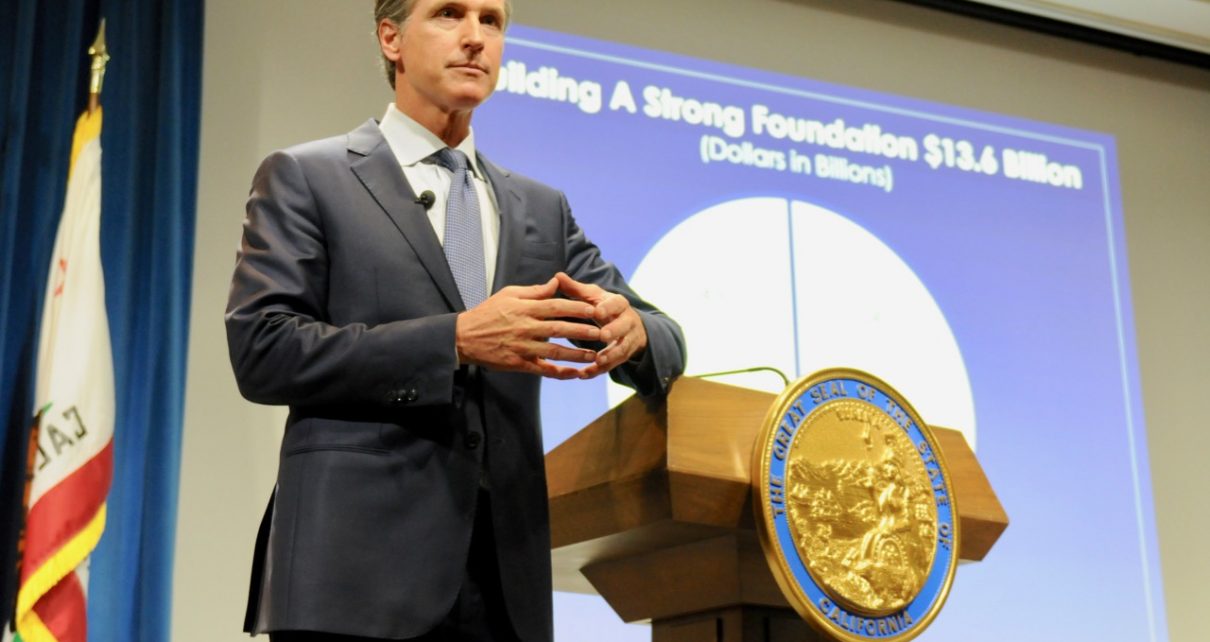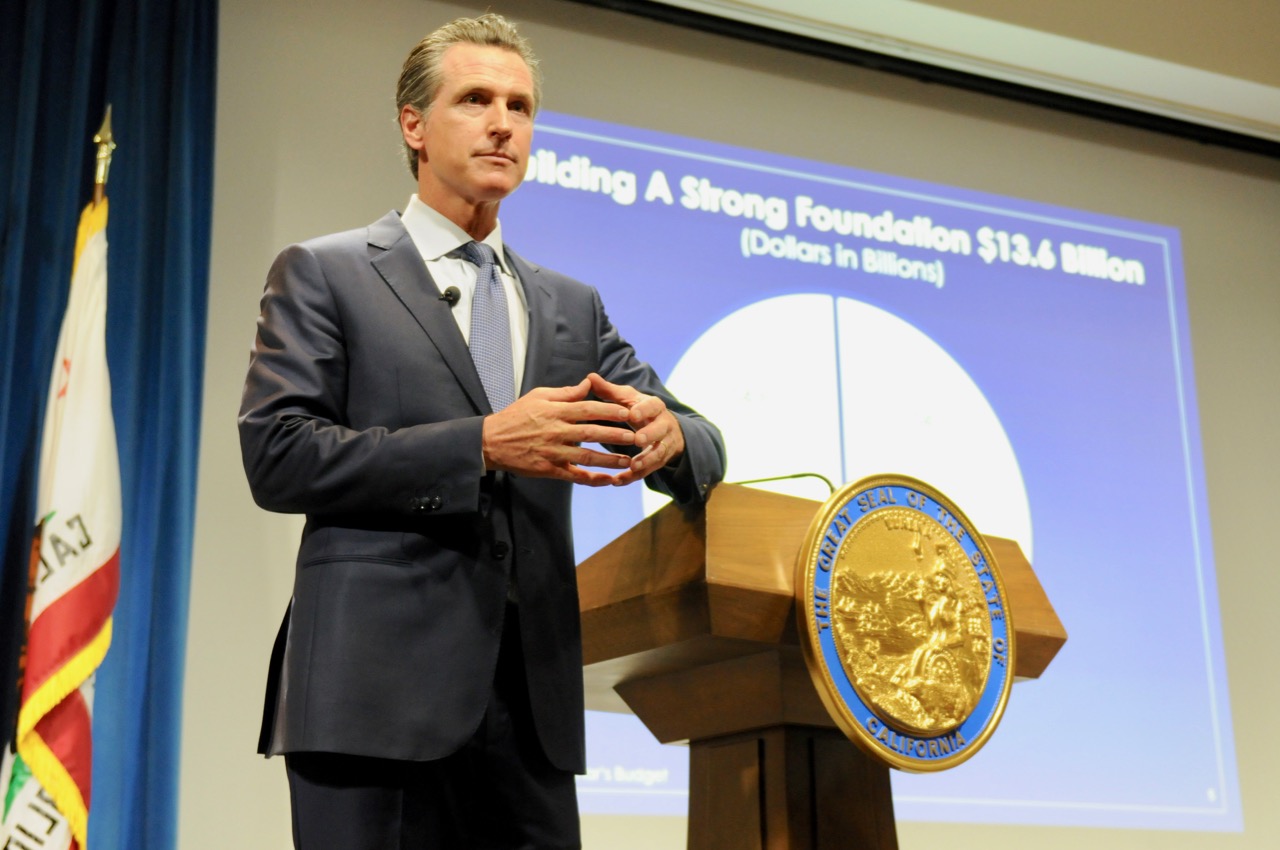
Relations Between The Governors Office and Trade Unions Worsens
Broken promises and cancelled projects less than a year into Governor Newsom’s term
By Evan Symon, December 3, 2019 9:06 am

After almost a year of a growing rift between California labor unions and the Governor’s office, new warnings of an economic downturn and further cost-cutting in the state budget are bringing the situation to a head.
From support to discontent
When elected in 2018, Gavin Newsom had most major union in California backing him to some degree. Promising union jobs in everything from a high-speed rail system to more government services, he had support of unions ranging from the giant State Building and Construction Trades Council of California (SBCTC), the historic Cesar Chavez founded United Farm Workers, to United Auto Workers, who doesn’t even have a presence within the state.
But, as the Los Angeles Times noted, Newsom quickly cut back on what he said he was going to do.
The famed Sacramento to San Diego high-speed train system was drastically scaled back, putting an estimated 50,000 jobs in jeopardy.
“The current project, as planned, would cost too much and respectfully take too long. There simply isn’t a path to get from Sacramento to San Diego, let alone from San Francisco to L.A.,” stated Governor Newsom earlier this year.
While the train cut-back angered the SBCTC, a water project offering thousands of jobs between Sacramento and the San Joaquin Valley brought similar outcry. And then a highways project was cancelled. Followed by cutbacks on state-owned building renovations in Sacramento. And then another. And another.
Meanwhile the California Nurses Association (CNA) went towards striking and protesting, partially due to Newsom not going forward on a single-payer system, despite the CNA asking for it for years.
Further steps away from unions, such as his last minute pulling of SBCTC president Robbie Hunter from a state commission about automation in the workforce, not signing 3 major union backed bills into law, and angering the California Teachers Association by not signing an extended maternity leave bill, have made Newsom unpopular among those in labor. While he has been praised by a few labor groups, most notably the California Labor Federation over signing the law giving child care workers in California the right to strike, they have been few and far between.
A new union-Governor battle on the horizon
And now with the clock ticking on a new budget, and California showing signs of an economic slowdown, many in labor are worried that a new year of cuts will lead to even more union losses.
“It’s on everybody’s minds,” said Felipe Calderon, who has been chapter president of two separate unions, as well as a former union organizer in several Southwest states. “California is still regarded as a top place for unions to go, but we’re being squeezed now for the first time in a while. We’re losing blue collar jobs left and right.
We have an auto plant in California, but there is no UAW. We have skilled unionized workers who are left sitting while others slash their prices to get hired, but then come screaming to us when they want help in getting a fair shake from the person who hired them.
We have more and more teachers opting out of unions or choosing to go unrepresented in charter and private schools. We have more strikes, but companies have dug in their heels more. We had three bills that would have given union pay for thousands of workers, but he vetoed them away.
And now we have a Governor, who we all believed could help fix these things, now taking what he promised away. It’s a working class betrayal.”
Big changes, big consequences
Any change to the budget or state funding in general would have huge ramifications for most unions.
“If they take out a big construction project again, that’s people who can’t work,” noted Sarah Bellard, a right-to-work activist in California. “But that also means the union loses members or loses the ability to recruit more. It stops unions from getting too big while also saving the state money. Some are projects that are needed, granted, but they also can be done by non-union labor cheaper for the same quality.
We need unions, but we also need to have a budget, especially since California could be facing even more money problems than they do now. One of the reasons these projects have been cut is because union workers are charging too much. And if they lose more projects, it means they’re weaker.
They’re holding huge wages for some members over the heads of the California taxpayer.”
But Calderon sees the possible downturn differently, especially in regards to the Governor.
“It’s not screwing over the taxpayer,” explained Calderon. “It’s getting a fair wage for hard work. And yes, we are upset about losing jobs, but it’s not about the lost memberships. It’s about getting people to work. And the governor is denying thousands of people that for big things California needs. Big things California would get money from in the event of another recession.”
With a still deteriorating relationship, the Governor and labor unions in California have only a limited window before major decisions regarding the amount of union jobs and projects in California is decided on again.
- Bill to Require Law Enforcement Disclosure if AI Was Used To Help Write Reports - August 7, 2025
- Gov. Newsom Files FOIA Request To ‘Expose True Cost’ Of L.A. Federal Troop Deployment for Anti-ICE Riots - August 6, 2025
- California Redistricting: How Newsom’s Plan Will Demolish Hard Fought GOP Gains - August 6, 2025





Good…
Maybe they’ll join us in the recall initiatives…